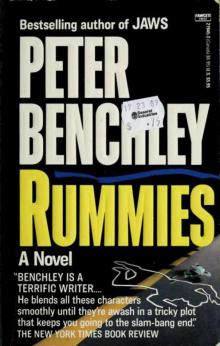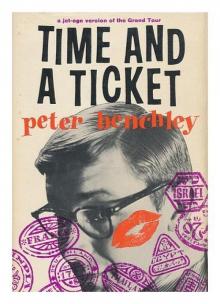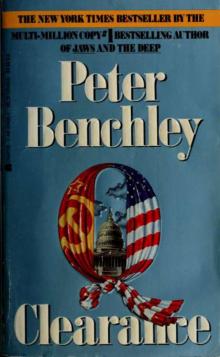- Home
- Peter Benchley
Time and a Ticket Page 5
Time and a Ticket Read online
Page 5
"Matalo!" yelled the crowd.
"Matalo, hell!" answered Bob. "Let the bull go! They let the gladiators go when they fought well, didn't they? Hey, Dooley, how do you scream 'let him go' in Spanish?"
"I'm not sure," said Dooley. "Try 'dejalo!' '
"Dejalo!" shouted Bob.
The matador went to the side of the ring to get the killing sword. The wound in his buttock had stiffened his leg, and he limped. When he had the sword, he came back to the center of the ring and faced the bull. The bull pawed the sand and charged. The matador jumped out of the way, and the crowd booed. The bull turned and stood looking at the matador. The boy moved slowly forward, placing each foot carefully. When he was only a few feet from the bull's horns, he stopped. He moved one step to his left.
"He's not going to go straight in," said Bob. "He's moving away from the hook and is going in over the side."
I yelled, "Chicken!"
The boy moved two steps closer, and as the bull lowered his head, he leapt in over the right horn and sunk the sword into the neck. It was no kill. The sword had gone in only a few inches. The boy reached up from behind the bull and pulled it out. The crowd hooted. The woman next to me threw a beer bottle into the ring.
The second thrust was deep, but not a clean kill. The bull wrenched his head to the left and knocked the boy spinning, then fell to his knees. He knelt there, shaking his head and drooling.
"He's blind now," said Dooley. "That's why he's moving his head like that, sort of desperate defense."
The bull would not die. The boy reached over the horns and pulled the sword out and jammed it in again. And again. The bull called out in a low groan. The boy was shaking. His fists were clenched, and Dooley could see through his binoculars that he was crying. He began to beat the bull on the neck with the sword, as if trying to decapitate it.
Four men ran into the ring. They positioned themselves around the bull and waved their capes over his body. The bull struggled to his feet and heaved his body around in circles, tossing his head. I asked Dooley what that was for.
"It circulates the blood," he said. "If his heart was even scratched, it'll kill him quickly. If not, then they do it till he bleeds to death. It speeds things up."
The boy had stopped beating the bull, and stood to one side, tears running down his face. Finally, one of the men hit the bull with his hip and knocked him over. He bent down and slit the bull's throat.
We left after the third fight. On the way back into the city, Bob was silent. Then, as we were parking the car, he said simply, "Jesus."
"I know," I said. "Pretty ghastly."
"It's not that," said Bob. "What bothers me is me. I just this minute realized what I was cheering for this afternoon. I was cheering for a man to get killed. Or maimed. And I'd probably go again, too, just hoping some matador will get gored. Jesus."
When we got to the hotel, we went straight to the bar, where we stayed until one in the morning.
5
We drove north along the west coast of France, through Biarritz and the Loire country and Chartres. Bob had to be in Paris by the first of September to take entrance exams for a graduate school of the Sorbonne, so we couldn't dawdle on the way back. But we didn't have to drive straight through, either, so we took two days off and lay on the beach at Biarritz. It was there that Bob got a letter from his father telling him to get off the beaches. "Every word from you in the past month has come from the seashore," read the letter. "Don't you think it might be nice if you moved inland for a while, just to see what the country is like?" We spent an evening experimenting with new infallible systems at the Biarritz casino, and moved on.
As soon as we got to Paris, we started looking for an apartment. We again took a room in the Hotel St. Paul, which suited us well financially, but still we had only one room. We had been staying in hotels for over two months, and we wanted more space.
The search lasted less than a week. Through friends of friends of friends, we met a woman whose mother had recently died and left her with a furnished apartment on the Rue de Saint Simon, a small street off the Boulevard St. Germain, near the Rue du Bac. She asked us to look at the apartment. What we had wanted was a small apartment, preferably with two bedrooms. What we found was a small palace. Two bedrooms, indeed. And two living rooms, a large foyer, a dining room with a table big enough for ten, and a huge kitchen. And every room, except the kitchen and the smaller of the two living rooms, furnished Louis XVI. The price, we were told, was a terribly reasonable $260 per month. How, wondered the landlady, could we turn down such a bargain?
"Much too much," I said.
"You're right," said Bob. "It's nice, though."
"Sure, it's nice. But so is Versailles."
"I guess you're right."
"There is one thing," I said. "We'd probably never get a chance like this again, to live in a place like this for that money."
"Mmm."
"I mean, I just thought I'd bring it up while we were considering all sides of the situation."
"And we have been looking around," said Bob. "No one can accuse us of jumping in blind."
"We certainly have. And we haven't found anything even halfway decent."
"No. Anyway, nothing like this."
"And that St. Paul is getting cramped."
"Besides," said Bob, "what reason have we to believe that we'll ever find anything better than this?"
"None whatsoever. That's a good point. We might even get thrown out of the St. Paul, and then where would we be? With no place to go, that's where."
Bob looked pensive. "We can't," he said. "It's just too expensive."
"I know," I said. "Let's take it."
"You're on."
Life at 15 Rue de Saint Simon was not a great deal more productive than life at the St. Paul, but it was infinitely more pleasant. I entered the Alliance Francaise, the language school where foreigners learn French. My French was all right, but I felt that it was not beyond improvement. Bob attended classes at the Sorbonne. We read the papers (American for news, French for practice), went to a few museums, and walked around what is to me the most beautiful city in the world.
At night, if we didn't go to a theater or a movie, we dined late and long, usually at a restaurant on St. Germain called II Teatro. In August, II Teatro had been bombed. A plastique had been set off by the front door, and it had blown out the door, the plate glass window, and six light fixtures in the front of the restaurant. The owners' first thought was that the bombing was the work of Algerian terrorists, though II Teatro had taken no stand on political issues and was harboring no extremist from either side. Within ten days, the culprit was caught, after he had blown out the windows and doors of four more establishments in the neighborhood. He was a manufacturer of plate glass windows, and he had been periodically bombing the stores and restaurants in his neighborhood that had big plate glass windows. He explained to the police that business was bad, and he had only been trying to drum up some trade.
At 15 Rue de Saint Simon we were mother-henned by our concierge, a woman of sixty-three named Mme. Cuillet. Mme. Cuillet lived with her husband on the ground floor, and our apartment was directly above hers. Thus she knew what time we came in, how many people we had for parties, how late women guests were staying compared to men guests, and, since we had to ask her advice about cooking, what we had for every meal. She had only one complaint, and she used to voice it regularly. The first time she brought it up, she almost gave me a coronary. I had slept late, and I answered the door in my shorts.
She stood in the doorway, her hands on her hips, peering over her rimless glasses. "Bonjour, Monsieur Peters," she said. She had long since given up trying to pronounce Benchley.
"Bonjour, madame," I said, stifling a yawn.
"You had two young ladies here last night. Very late."
Oh, good God, I thought, she's going to start spying for the landlady. I said nothing, but looked at her with a stupid grin.
"You will do me a great
favor," she said, "if you will have your young ladies remove their shoes late at night."
"Madame?"
"If you please. It keeps my husband and me from sleeping, to hear the clic-clac of the heels on the wood floor above our heads."
"I am very sorry, madame. It won't happen again."
"Good," she said. "You will excuse me for bothering you."
She turned to go. "One more thing, if you will permit. Please do not have your young ladies slam the refrigerator door at two o'clock in the morning."
"Yes, madame. Once again, I apologize."
"It is nothing. How was your food?"
"Excellent, thanks to you."
"Good. Au revoir, Monsieur Peters."
"Au revoir, Madame Cuillet."
Two days later, Mme. Cuillet told us that the landlady had been inquiring about our conduct. Mme. Cuillet had told her that she knew nothing about our conduct, but she did say that we were very quiet and never disturbed her.
One evening at a party, I was standing by the bar when I was approached by a young man of approximately my own age.
"You're American," he said.
"Yes."
"Is this the first party you've been to in Paris?" He was French, but he spoke English with a crisp British accent. I would have been unsure of his nationality had he not half swallowed the r in 'Paris.'
"No. Why do you ask?"
"Curiosity, really. Very few Americans are invited to French parties."
"Should I feel honored?"
"In a way. It means the host doesn't think of you as a typical American."
"And what do you and the host consider a 'typical' American?" I asked.
"You know, the hail-fellow-well-met type. Horrid clothes, lots of noise, and no taste in anything or for anything except money. The kind that thinks culture means anything that appears on the telly."
"You really think that's the average American?"
"I suppose not, but it's the kind we see most of over here. How else can we judge?"
"Do you consider yourself an average Frenchman?"
"Well, I..." he stopped. "No, not really."
"How are you above average?"
"Money and education."
"And how many average Frenchmen do you know?"
"If you take average to mean middle-class businessman types, the shopkeepers and small industry people, I know some."
"Socially?"
"Not actually socially, no. I mean, I don't go out with them."
"Suppose you were to give five hundred thousand new francs, about a hundred thousand dollars, to your 'average' Frenchman," I said. "What do you think he'd do with it?"
"He certainly wouldn't rush off to a strange country and buy ghastly clothes and a big car and smoke cigars and try to buy everything and everyone he met, I can tell you that."
"How do you know he wouldn't?"
"I just know, that's all. The average Frenchman has better taste than that. He dresses conservatively, he goes to the opera, he—"
"He goes to the opera?"
"I think so. A friend of mine said he saw his butcher at the opera the other night. They read, too. And their table manners are far superior to almost any American's I've seen."
"Any way," I said, "what would your average Frenchman do with the money?"
"He'd make improvements on his house, maybe decorate it. He might buy a place in the country. He'd send his children to good schools and dress his wife in fine clothes."
"I'll tell you what I think he'd do with it. He'd—" A girl I had been waiting for tapped me on the arm and said that Bob was waiting downstairs with the car, so the conversation ended.
As the weeks went by, we got to know our grocer well. A young man with a wife and two children, he runs one of his father's two grocery stores. Although both stores are mortgaged and he and his father live on salaries, they make between four and six thousand dollars a year, which is much higher than the national average. Still, it does not qualify them for the upper middle class. It seemed to me that he fitted perfectly the description of the "average" Frenchman that the man at the party had given.
Sometimes the grocer, whose name was Maurice, stopped by for a drink after work, and twice or three times a week Bob or I would have coffee with him in a cafe across the street from his store. When we had known him for over a month and had invited him to two of our parties, he asked us to dinner at his apartment.
To get to Maurice's apartment, we had to walk through the bottle storage room of his father's store, the French equivalent of a Safeway or an A & P, but considerably smaller. The room was lit by a 25-watt bulb, and I barked my shins twice on cases of Coca-Cola and Perrier bottles. We were met at the door by Maurice's wife, Yvonne, a pretty, dark-haired girl with a bawdy laugh that had stopped conversations both times she had come to our house.
"Gooood eeveneeeng," she said.
I said I hadn't known she spoke English.
"I want to learn," she said in French. "You will have to teach me."
Maurice greeted us. He said they had just had the apartment repainted, and he would be happy to show us around. It was a small apartment, two bedrooms, a living room, and a tiny kitchen, furnished in what Bob described as bastard green-stamp baroque. A watercolor of a maroon-haired, hazel-eyed Christ in a twisted gold frame occupied the place of honor on the mantelpiece. The furniture in the living room consisted of one red plastic chair, one green plastic chair, two yellow straightback plastic chairs, and a big plastic table painted to look like wood and adorned with brass knobs on the legs. The tablecloth was a square of red-and-white-checked oilcloth. Three standup lamps with white plastic shades flecked with gold, and two wrought-iron end tables (matching) were placed around the room. In the master bedroom, a hand-colored photograph of Maurice's father hung over the double bed facing a watercolor of a maroon-haired, hazel-eyed Virgin on the opposite wall.
When he had first invited us, Maurice had apologized for the dinner. "It will not be like what you serve," he said. "Meat like that, my God! We never see it. Meat is not a big part of our diet. Too expensive." And as we sat down to eat, he apologized again. "I know you like meat," he said, "but perhaps you will enjoy a salad." The dinner was vegetable soup, shrimp salad, cheese, and a vin de table.
Yvonne pointed her fork at me. "You must talk to Maurice," she said. "He wants to buy a car. It is stupid. He has a car."
"I have a car, yes, but it is old."
Bob asked what kind of car he had.
"A DS-19, but an old one," said Maurice. The DS-19 is the French Cadillac, the car made by Citroen that French businessmen use for limousines. Some people call it "the fish" because of its low, sloping front end.
"Why do you want a new one?" I asked. "The DS-19's look the same from year to year."
"I didn't say a new DS-i 9. I may get a Jaguar."
"A Jaguar!" shouted Yvonne, and a piece of shrimp flew out of her mouth. She slammed her fork down on the table. "And after that perhaps a yacht and an airplane?"
"But have you seen the people who drive the Jaguar? That is an automobile. It has real chic."
"We need many things before a Jaguar," said Yvonne. "But if you want to throw your pennies away, you can take me to the Cote d'Azur." She turned to me. "After dinner you must tell me about the Cote d'Azur. I have always dreamed of living in a villa with lots of servants. They have that there, no?"
"They have that there," I said.
"Oh, if we had the money, there are such magnificent things we could do!"
"What would you do?" I asked.
"Buy a Jaguar," said Maurice.
"And go to the Cote d'Azur for four months a year," said Yvonne, "and have new clothes and a fine apartment."
"We would also buy a lot of meat," said Maurice. "Every night we would have meat."
"You and your meat," sniffed Yvonne. "You have lived all your life without so much meat. You could live a little longer."
At a party a few days later I met the captious yo
ung man who had felt so strongly about the hideousness of the American middle class, and I told him about our dinner with Maurice. He conceded that the ''average" Frenchman might not be all he had made him out to be, but the concession in no way softened his harangue against Americans. He seemed obsessed with trying to prove the cultural superiority of the French.
One group of Americans that he seemed to be almost fanatical about was what he called "the bearded ones," the beatniks. "They are all over Paris," he said. "And they stick out like pustules on the face of the city."
I was in no position to argue with him about these particular members of the American expatriate set, for Bob and I had almost no contact with them. Our lack of association with them was not entirely our own choice. We would have been interested in spending some time with them, to see how they lived, what they thought, and what they were accomplishing. But by our dress, our friends, and our interests, we would have been classified by them as squarer than square: "Cube, man."
We did meet one member of this set, however. His name is Gino, and we had heard about him often, from bartenders, from our own friends, and from eavesdropping on conversations in cafes. We had seen him shuffling down St. Germain or bending over a bar in deep conversation with the bartender. If we were going to meet any of the group, we thought, Gino was the one, the extreme example, the prototype of the American beatnik abroad. Even before we finally did meet him, we knew the following about him:
Gino has two possessions, a beard and a guitar. I had never seen his guitar, but I hoped it was in better shape than his beard, which is not a good one. It is long and scraggly, and it grows wild and untrimmed, like black underbrush flecked with brown. It catches food. His beard does two things for his appearance: first, it complements his clothes, which are always drab and usually filthy; second, it hides a hideous set of teeth—brown, crooked, stumpy teeth that can not have been brushed for years.
No one knows where Gino will be at a given time. For more than five years he has been traveling from city to city in Europe, living off his friends, who are, almost to a man, American expatriates something like himself. He never asks for much—five dollars from this one, three dollars from that one, and they're always "loans," with a smile. When asked what he does, Gino replies that he is studying guitar. He has been studying guitar for a long time. How much longer will he be studying guitar? He doesn't know. Most of the time he wanders. He sits in cafes talking to people who claim to be writers or painters. He goes to someone's room, and they sit on the floor and listen to music.

 Peter Benchley's Creature
Peter Benchley's Creature The Island
The Island Rummies
Rummies The Girl of the Sea of Cortez: A Novel
The Girl of the Sea of Cortez: A Novel Time and a Ticket
Time and a Ticket Jaws
Jaws The Deep
The Deep Q Clearance
Q Clearance Shark Trouble: True Stories and Lessons About the Sea
Shark Trouble: True Stories and Lessons About the Sea White Shark
White Shark Shark Trouble
Shark Trouble Shark Life: True Stories About Sharks & the Sea
Shark Life: True Stories About Sharks & the Sea